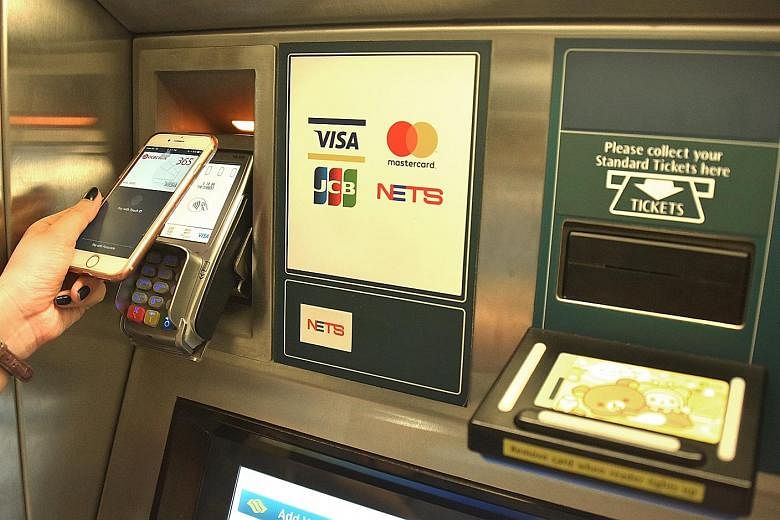A trial system that allows commuters to pay their public transport fares using contactless credit or debit cards will be extended to Visa and Nets users from next June.
Mobile payment modes - such as Android Pay and Apple Pay - will also be available from the first quarter of next year as part of the trial.
A pilot of the system for MasterCard users began in March, and currently has more than 100,000 participants, with an average of about 60,000 transactions daily.
By allowing commuters to use contactless credit or debit cards, the system removes the need for Cepas cards such as ez-link or Nets FlashPay.
Senior Minister of State for Transport Lam Pin Min announced the expansion of the pilot in Parliament yesterday, in response to questions from MPs.
More details on the expansion will be announced later, said the Land Transport Authority.
The MPs' questions follow an announcement last month that the entire public transport system will be fully cashless by 2020, with cash top-ups no longer available.
Ms Tin Pei Ling (MacPherson) asked how elderly commuters who rely on cash as their sole mode of payment will be included in the move to a cashless system.
Dr Lam replied that more than 98 per cent of commuters here already use Cepas - or contactless e-purse application specification - cards to pay their transport fares.
This figure includes "most senior citizens", he said, noting that there are about 700,000 senior citizen concession card holders.
A quarter of the 150 service agents who will help commuters learn to use ticketing machines over the next nine months are senior citizens themselves, he added.
Dr Lam also told Dr Tan Wu Meng (Jurong GRC) it costs almost $20 million a year to maintain cash facilities at MRT stations and on buses.
Dr Tan also asked if public transport operators would consider hiring staff fluent in dialects and vernacular languages, to help the elderly adjust to a cashless system.
In response, Dr Lam said the Government will urge the operators to hire more staff who can engage senior citizens more effectively.
He also noted that during consultations and focus group discussions about going cashless, up to 30 per cent of those consulted were senior citizens.
Mr Zaqy Mohamad (Chua Chu Kang GRC) asked if savings from the removal of cash facilities would be passed on to commuters. This would depend on the profits and losses of public transport operators, Dr Lam replied.
As to whether the fees currently imposed on ez-link card top-ups - which can cost up to 50 cents at convenience stores - could be reduced, Dr Lam said this is an issue for the various agencies involved to discuss.
Mr Ang Wei Neng (Jurong GRC) wanted to know how those without bank accounts or who are unable to maintain a minimum deposit in their accounts will be accommodated in a cashless system.
Dr Lam said the Transport Ministry and the Monetary Authority of Singapore will work with the banking industry and grassroots organisations to help the elderly adjust.
He also told Mr Louis Ng (Nee Soon GRC) the authorities will look at how to facilitate the opening of bank accounts for foreign workers.


